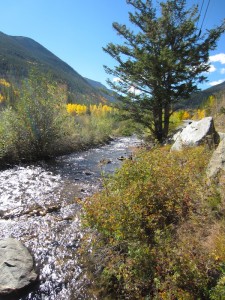From September 13, 2010 Written right after I was back home after being evacuated for wildfire (I was gone 5 days). With recent wildfires near loved ones, I thought I’d share this again.
Living in the forest has always brought with it a possibility of wildfire. For over twenty years I have learned and implemented as much as I could about wildfires, had an emergency plan in place and actually prepared to evacuate several years ago. So when the word came out Monday around noon to get ready to leave, there was no panic, just action putting the plan into place.
Then on Thursday, when the winds kicked up again and the city of Boulder advised an additional nine thousands residents to be prepared just in case they needed to be evacuated, the response was more chaotic. I know of people who panicked along with people who refused to believe there was any need for action.
The most common question was what should I do?
Since the events of this week have made it clear that a disaster could happen to any one of us, here is my advice.
The time to prepare for a disaster is now, especially if you are not in any immediate danger.
Don’t wait until you have to think up a plan while scared, anxious, or needing to help others. It won’t take more than an hour or so to come up with your plan. Even if you can’t find your plans and lists when disaster does strikes, you’ll be able to recreate quite a bit of it from memory.
The most valuable part of planning for me was knowing where things were. I keep many papers in a file close to the phone and so was able to pack up a lot of valuable information very quickly.
Here are some lists that can be stored on a cell phone, computer, and also printed out and kept near the home phone for easy access:
- Phone numbers and addresses for family and friends, with as many cell and home phone numbers as you can gather (and make sure you know which one is which).
- Phone numbers for health care professionals and health insurance.
- Phone numbers for house insurance, lawyer, accountant, or any other advisors.
- Phone numbers for neighbors.
- Phone numbers for employers – making sure you have some alternate contacts.
Here are other lists that should be kept more securely (I have a fireproof box).
- List of logins and passwords for internet accounts.
- List of driver’s license numbers, social security numbers, and passport or visa numbers for all family members.
- Copies of first 2 pages of recent tax returns.
- Copies of recent investment accounts.
Here are some things that ought to be stored off site.
Now is the time to set up safe deposit boxes, offsite computer backups, or whatever is needed.
- Birth, marriage, divorce and any other life defining certificates.
- Deeds and titles to registered vehicles.
- Wills, power of attorney, stock certificates, etc.
- Back up of critical computer files.
- If you ever are organized enough to create a home inventory (video or via list), keep a copy of this off site as well.
With wildfires or bad storms, people are often back in their homes in a day or so, but I recommend packing enough clothes, toiletries, medicines, etc. as if going on a three day trip, and taking at least one extra pair of shoes. Pets should have everything they need for at least three days as well. Make sure you take all check books, credit cards, and all cash in the house along with you (I dumped my bowl of coins in my purse and was glad to have change handy). In addition, I have just added the cell phone charger, police scanner, binoculars, flashlight, and a jacket to my list of what to take for the next evacuation. Hurricane evacuees have blankets, water and food on their list, and they often plan out their routes clear ahead of time. When traveling in winter I carry candles and matches to help heat a stranded car. Everyone’s list is going to be a bit different, I am just hoping everyone has a list and gives a little extra thought now to what they will do in an emergency. For those who may not have heard, I got home to a house that suffered no damage. In fact, there wasn’t even a momentary power outage during the evacuation. But it would have only taken one larger wind gust, or just a slightly slower response from fire fighters and my tale could have been quite different.
The Boy Scouts got it right. Be prepared.



